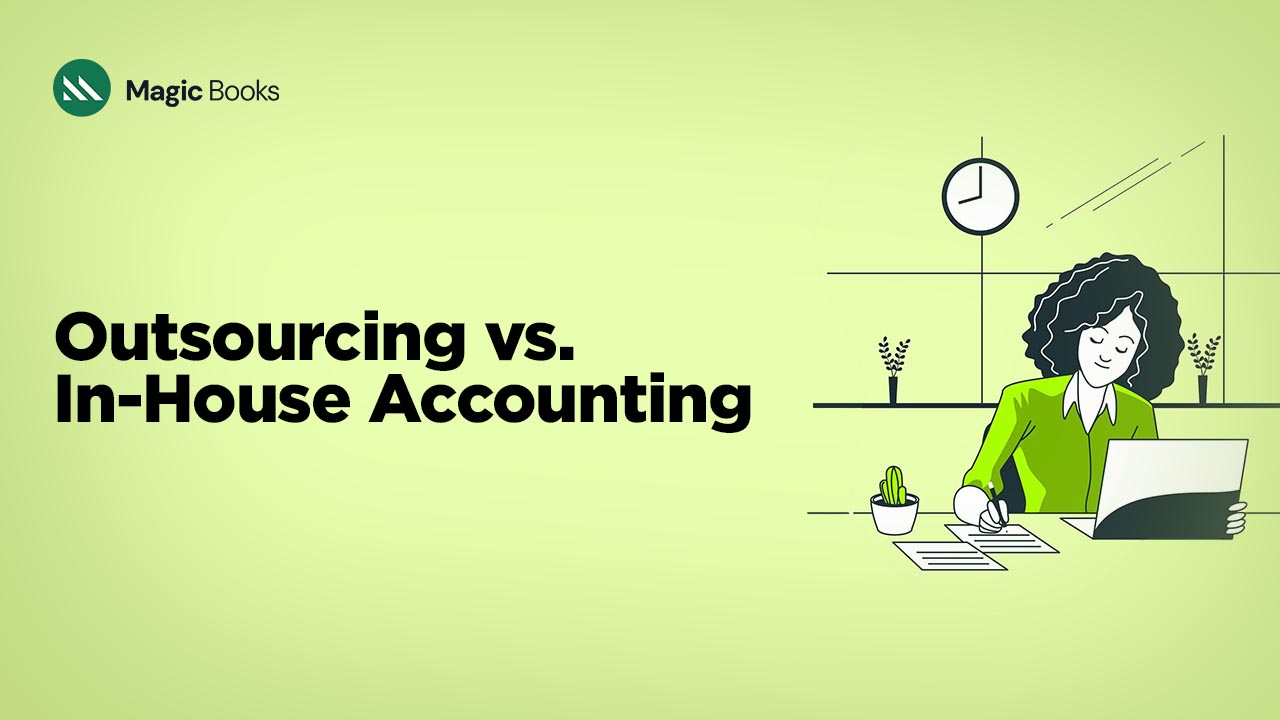Small and medium-sized businesses are often faced with the choice of bookkeeping and accounting, which come along with growth. “Should we hire a controller or do it ourselves?”
Another option often not explored often is outsourced accounting services.
It was not common ten years ago to outsource accounting, but today, small businesses are increasingly using full-service outsourced accounting firms. It enables them to work better, look more professional, and save time and money.
The CEOs and business owners thought this was the best way, as they could stay in control of the process. However, with modern technology, outsourced accounting has emerged as the new option for businesses that want to expand in an effective manner.
There are many good and bad points about using outsourced accounting services compared to in-house accountants. Most businesses have usually depended on an in-house accountant for their bookkeeping and accounting tasks. However, due to the improvement in technology and a booming economy, businesses now have many affordable choices to outsource their accounting and bookkeeping.
Most businesses face the problem of finding the best accounting option they need. It is challenging to find the best in-house accountant and the right outsourced accounting firm. Accounting can be very complicated for a small business, and a failure to deliver “exceptional” work can be devastating for the business.
In-house accounting is essentially working on the finances inside a company. You would be more in control, but this usually costs you more money and less expertise. Comparatively, you have a wider array of skills and better technology when you outsource accounting compared with in-house accounting; usually for a lower price. The differences between an outsourced accountant and an in-house accountant include training, control, reporting, and cost. A business needs to be aware of these advantages and disadvantages in order to find the best solution for its accounting and bookkeeping needs.
What is In-house accounting?
Basically, this is about in-house accounting; that means the accounting is made internalized as it is done by company people.
Usually, in-house accountants have to manage most of the financial tasks that are more than just adding and subtracting. In addition to these, technical support, human resources, and bookkeeping must be managed all at once. It is very hard to find one person who can do all these jobs well and has skills for each of them.
Some businesses require that the numbers be taken care of by a group of people who know the details, but this has its disadvantages. More often than not, instead of paying attention to critical plans, workers are busy doing manual work like reconciling transactions and checking account balances to close out the month. This is also why most employees leave the in-house model. This brings much employee burnout.
What is outsourcing accounting?
Let’s now understand what really means to hire accounting services from another team. Simply put, you pay an outside company to perform accounting and/or online bookkeeping for you. For instance, the outside company can take care of your payroll, money you are owed, money you owe, expense reports, and virtually everything related to accounting. In simple terms, they work very hard.
That may be a lot of change for some businesses; therefore, it is a good idea to weigh the pros and cons.
What are the advantages of Outsourcing Accounting?
More financial education: Typically, hiring an employee to work in your company would transfer most or all the money management tasks to one person. This man or woman can soon feel overwhelmed with a number of jobs that are not adequately controllable and end up taking jobs he or she is not trained on, which endangers the financial well-being of the business.
You will benefit from a qualified team if you contract another company to handle all accounting and finance. The right person will take charge of it and be able to complete more effective tasks.
Higher expertise equates to better reporting and accuracy of financial statements. In addition, accounting outsourcing means that there are several people available to offer several layers of oversight that reduce errors and even opportunities for fraud.
Customizing your services: Using the help of others, you can mold your services and use specific skills only when you really need them. Therefore you may ask for help in M&A analysis, succession planning, annual budgeting, or strategic financial planning when it is timely and appropriate for the company.
Generally, tasks like M&A analysis, succession planning, or annual budgeting should not be something undertaken by a small business on a weekly or even monthly basis. As a business owner, you may only think of keeping your books in order and correct. However, when doing annual budgeting, an expert is very handy.
Investigate your money more closely: Accounting should be outsourced rather than being done in-house since this will keep the record in good order, giving an opportunity to study more details on finance. More analysis may show some opportunities to raise revenue or to lower costs in making a business as efficient and profitable as possible.
In fact, if you’re currently outsourcing your accounting function and all you’re getting is basic bookkeeping and balance sheet reconciliation, then you’re not really benefiting. True outsourced accounting should include holistic financial management and both operational and strategic advice.
Here is a fact, At Magicbooks, we analyze the financial data that helps small companies compete with the big ones. We are not just bookkeeping services but help our clients find ways to increase cash flow and prepare their businesses for long-term success. This really changes the game for a small business and guides them to the right path.
Accuracy and Timeliness: Accounting and financial record-keeping become very time-consuming and confusing for the business owner. It is even so to some of the most financially inclined minds.
The more eyeballs checking will translate to better numbers. A focused team looking at your accounts will hugely enhance the accuracy of your financial reports. When you compare in-house accounting versus outsourcing, you will be aware that outsourced accounting services are highly flexible.
Good Methods of Working in Different Sectors: We work with many clients in different industries. This experience helps us provide industry standards and spot any possible weaknesses or chances for business improvement.
Checks and Balances: Nobody likes to contemplate fraud or theft, but when only one person handles the cash, payments, and accounts, it definitely increases the possibility of fraud or theft. It strikes nearly two-thirds of small businesses, so this happens more than most people know.
More security is also offered by using an outside accounting firm. Systems and procedures for internal controls may be designed to prevent fraud or theft before it ever occurs.
Save money: As a small business, you might not need someone to manage your money all the time. Hiring outside help for this can give you more flexibility and save you money.
An outside accounting team can save you so much money while keeping your records organized and correct. Besides, your workforce is going to be able to focus on expansion rather than doing bank reconciliations or journal entries.
In addition, outsourced accounting firms offer access to a strategic financial advisor at a fraction of the cost. It would be too expensive for your business to hire someone like this in-house.
In-house workers have additional costs aside from the salary. These include benefits, payroll taxes, office space, and IT equipment. With an outsourced accounting model, you can save money and apply it more effectively to your business.
What are the advantages of in-house accounting?
In-house accounting facilitates easy accessibility to financial information and accountants quickly, which in some cases can be extremely important for businesses requiring immediate financial decisions.
The in-house team is closely related to the culture of the company and its daily work. This proximity helps them be more aligned with the company’s goals and plans. Moreover, it allows a more personal way of handling finances which can help respond faster to financial questions and problems. In addition, having an in-house team can make stronger internal controls because the staff cares about the company’s success and understands its details well.
However, these advantages come with their own set of challenges such as increased costs of salary, benefits, training, and infrastructure. Small and medium-sized enterprises may find these costs too high, especially when they recognize the benefits of outsourcing accounting services that can grow with them and provide different skills. Housed accounting has its merits, but typically outsourced is far more cost and flexibility-friendly for businesses seeking finance rationalization towards expansion.
What are the signs of having an outsourced accounting service?
Becoming a business owner is really challenging because one will never know at what point they need extra help with accounting services. Some times when it might be a good idea to get help from others include:
- Your firm is experiencing rapid growth, and you want better control of money management.
- Your bookkeeper who worked in-house recently left, and you need a fast solution.
- Your office manager is taking care of your bookkeeping and recording the growth.
- You feel that your bookkeeping is too complicated and worry about how accurate your financial statements might be. (You’re not alone; many business owners have this worry and decide it’s time to get help.)
- The company has prepared itself to be sold.
- You want to find ways to earn more.
Getting outside help with accounting can help businesses in almost any field, including construction, manufacturing, nonprofits, marketing, technology, and professional services.
Make sure you accurately balance the costs for in-house accounting versus outsourcing. It’s not just how many dollars you pay an employee per year. It’s the benefits, so health insurance and 401K. There’s even the productivity cost of your paid time off, or when your employee is otherwise unavailable during sick time and vacations.
Outsourcing essentially comprises most of the benefits of in-house accounting over outsourcing. It is especially for small and medium-scale businesses that look forward to achieving efficiency and expansion.
The accounting process is outsourced to the company that provides its skilled experts and modern technology without having to pay them full-time employees’ high costs. This eases up financial management, and thus, business leaders can take more time to grow the business and innovate. If your in-house accountant is low-paid but highly skilled, you’re lucky. The cost may be well worth it. Otherwise, look into outsourced accounting, which typically charges an up-front fee, plus an hourly rate.



